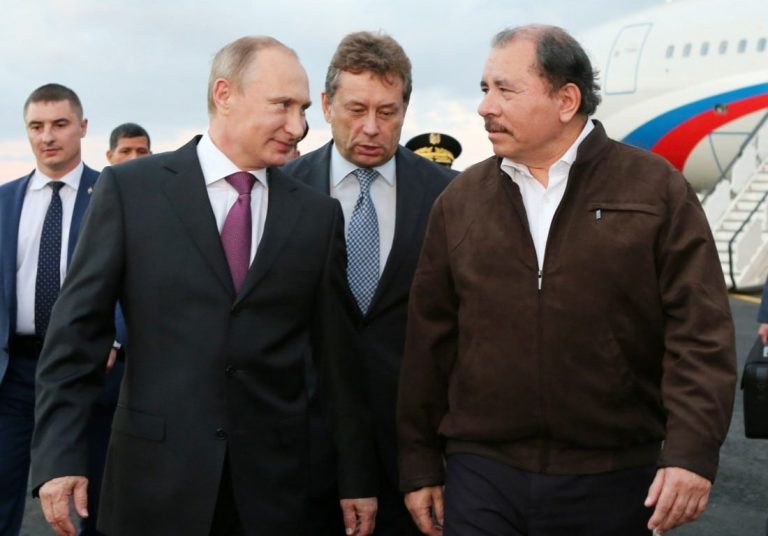19 de julio 2021

Ortega Grants Chinese Company a Huge Mining Concession

PUBLICIDAD 1M
PUBLICIDAD 4D
PUBLICIDAD 5D
Foreign Minister Moncada will meet on July 19 with his Russian counterpart, his priority is respect for the "sovereignty" of the peoples

The specialist in Russian foreign policy notes: “Managua
The hours prior to the commemoration of the 42nd anniversary of the Sandinista revolution were like preparations for an act of nostalgia. The anniversary will see Daniel Ortega publicly attacking the United States again and defending Cuba, at the same time as he is seeking protection from Russia after demands from the international community that his government end the repression that has plunged the country into uncertainty in this presidential election year.
In recent months, 26 opponents of the government have been jailed, including six presidential candidates, whom Ortega labeled “criminals” before they were brought before a judge, thus closing off the possibility of a change in government through electoral channels as his critics had hoped to do. [Another 120+ political prisoners were already in his prisons.]
At 76 years, and after 14 consecutive years in command of the executive branch, the only ally Ortega has left at the international level is Russia, with the United States, Canada and the European Union demanding accountability from Nicaraguan officials involved in cases of corruption or human rights violations.
In an official statement, the Russian Foreign Ministry reported that Foreign Minister Sergey Lavrov will receive a visit from his Nicaraguan counterpart Denis Moncada, with a plan to discuss “a range of issues” of bilateral interest, including the response to the pandemic.
However, in addition to commemorating the fall of the Somoza dictatorship in July of 1979, Russia emphasized that one of the priorities of its foreign policy in Latin America and the Caribbean is “to further strengthen the strategic alliance with Nicaragua”. The Russian Ministry described the points of view that unite Vladimir Putin and Ortega: rejecting all interference in internal affairs along with the non-recognition of coups d’état as methods to change a government.
The press note announcing the meeting between Moncada and Lavrov made the front page of the government’s 19 Digital website, while the email account of Vice President Rosario Murillo, the government’s only spokesperson, posted statements commemorating the overthrow of Somoza.
More than 40 years after the removal of Somoza, opponents point to Ortega and Murillo as dictators, given their control over all state powers and their ongoing attacks on their critics, even as their officials resist being held accountable for their actions.
“These events are part of Ortega’s logic of trying to position Nicaragua in a supposed new Cold War, in which Nicaragua is allied with Russia. But Russia is not the Soviet Union. Ortega should allow fair elections to ensure the possibility of a transition to democracy,” commented Héctor Mairena, spokesperson for Unamos and part of the international relations committee for the Blue and White National Unity opposition group.
The National Assembly (with a pro-government majority) issued a statement calling Canada’s foreign relations policy “hypocritical” and accused the Canadian government of using a “double standard.” A main signer of that statement is National Assembly President Gustavo Porras, a close ally of the presidential couple, and one of the 24 recently sanctioned by the Canadian government.
The declaration by the Nicaraguan National Assembly, in which they say that they are “moved” by the discovery of thousands of indigenous children buried in Canada, came two weeks after Murillo also used similar qualifiers against that country. “These practices of cultural extermination expose the crimes against humanity and genocide by the Canadian government,” reads the legislative document.
Among the 24 sanctioned by Canada are ministers, political advisers, presidential advisers, police chiefs, members of the Supreme Court and legislators such as Porras and two of the presidential couple’s children, Laureano and Camilo Ortega Murillo. As part of the international community’s response to the reported abuses, the US also suspended the visas of 100 senior officials (including legislators, judges and prosecutors) and some of their relatives for their actions against democracy. Twenty-six out of 33 countries signed on to the recent OAS condemnation of Daniel Ortega.
On July 15th, in her daily noon address, Murillo reacted to external pressures, referring to the US ambassador in Managua: “with his arrogance that is displayed in the corridors of the White House, he does not respect diplomacy. Now, if he wants to speak, let him remove his investiture, and he will see that his stay on this planet is short-lived. And we are not talking about war…,” she said, without mentioning diplomat Kevin Sullivan by name.
This article was originally published in Spanish in Confidencial and translated by Havana Times
Archivado como:
PUBLICIDAD 3M
Periodista nicaragüense, exiliado. Comenzó su carrera en el año 2000, cuando todavía era estudiante. Por sus destacadas investigaciones periodísticas ha ganado el Premio Ortega y Gasset, el Premio Internacional de Periodismo Rey de España, el Premio a la Excelencia de la Sociedad Interamericana de Prensa, y el Premio Latinoamericano de Periodismo de Investigación del Instituto Prensa y Sociedad (IPYS).
PUBLICIDAD 3D